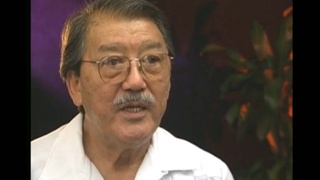Entrevistas
The lawsuit set the standard for restoring people’s rights
There are a number of reasons why I think the lawsuit is beneficial, and I won’t remember them all right now, anyway. They might come up as we talk.
A couple of them, first of all, defines what redress is, in terms of the injuries, the twenty-two causes of action, and the remedy, the amount that we were asking, which came to about twenty-seven, twenty-eight billion dollars. So it set a standard. The statement of injuries is very important, because the legislation doesn’t do that. [It] doesn’t define injuries. It doesn’t state what they are. My own feeling is that if you had to state the injuries the legislation would have never passed, because Congress does not like to put the government in the position of having to admit to error. So Congress just deals with the bottom line—what it’s going to cost, how the thing is going to be implemented, how much are we going to pay people, and so forth, on various levels of this thing, and the time frame—all that stuff—and the impact on the rest of the government. So the lawsuit was important in setting the standard.
It also was important in the sense of—I felt it was very important because it put us in an adversarial relationship—Japanese Americans versus the United States. And that was something that was new to us. We never had been in that situation. We had always been loyalists. You can almost summarize the Japanese experience up till then, anyway, in this one term—loyalty. Here we were taking the United States of America to court. I think that was, at last, the appropriate relationship for us to have. There was nothing nasty about it. We weren’t trying to brutalize the United States (laughs) or abuse the United States. We were just seeking what our rights were under the law, but we also wanted the United States to be held accountable. I think that was maybe one of the important things, as far as restoring the proper relationship between ourselves and our government. It’s something that is not just Japanese Americans that have to learn that. There are a lot of people that have to learn that. That’s what I think the last second half of this century has been about—the restoration of people’s rights in relationship to the government, and civil rights, and feminists, and gays, and everything else, trying to establish a healthier relationship. I think that that’s been very positive. I think it was very important for Japanese Americans to do that, too.
Fecha: June 12, 1998
Zona: California, US
Entrevista: Darcie Iki, Mitchell Maki
País: Watase Media Arts Center, Japanese American National Museum
Explore More Videos


Crecimiento en el número de asistentes (Inglés)
(1928 - 2003) Activista político

Convenciendo a la gente de Washington DC (Inglés)
(1928 - 2003) Activista político


Los sansei y el movimiento por el resarcimiento (Inglés)
(n. 1922) Músico

El hacerse activo en el Movimiento por los Derechos Civiles (Inglés)
Juez, único japonés americano que sirvió a CWRIC

El acuerdo de una suma de dinero en dólares para el resarcimiento (Inglés)
Juez, único japonés americano que sirvió a CWRIC

Decidiendo trabajar en la CWRIC (Inglés)
Juez, único japonés americano que sirvió a CWRIC

Escuchando sobre la elección del Senador Inouye para la CWRIC (Inglés)
Juez, único japonés americano que sirvió a CWRIC

Sentimientos personales como comisionado nikkei (Inglés)
Juez, único japonés americano que sirvió a CWRIC

Un testimonio memorable de la CWRIC sobre una situación injusta (Inglés)
Juez, único japonés americano que sirvió a CWRIC

Entendiendo la pasión detrás de las personas que dan sus testimonios (Inglés)
Juez, único japonés americano que sirvió a CWRIC

Razones por las que rechazo el pago de resarcimiento (Inglés)
Juez, único japonés americano que sirvió a CWRIC

El futuro de los americanos japoneses tras el resarcimiento (Inglés)
Juez, único japonés americano que sirvió a CWRIC

Los criterios para recibir resarcimiento (Inglés)
(1917 - 2004) Activista político
